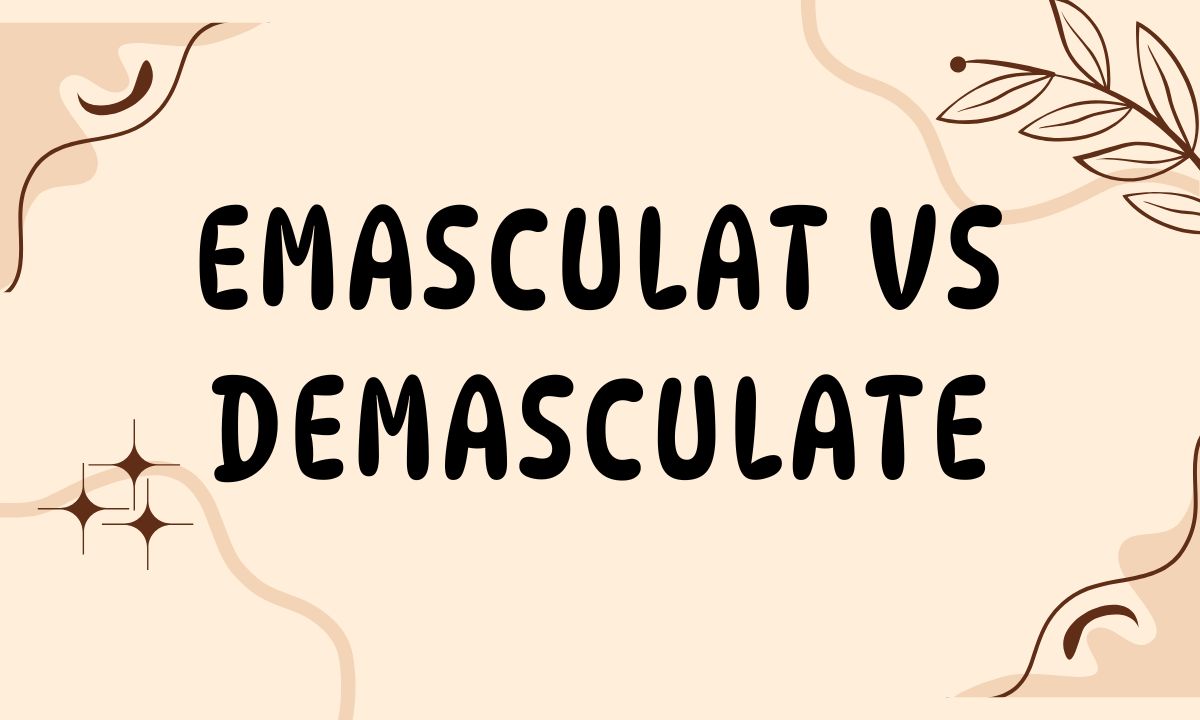Emasculate vs Demasculate is a common point of confusion for many English speakers and writers. While both words relate to masculinity and power, their usage, recognition, and historical context differ significantly. Emasculate is widely accepted in English and is often used figuratively to describe a loss of confidence, authority, or power.
Demasculate, on the other hand, is a rarer term, often seen as a variant of emasculate but not standard in formal writing. In this article, we will explore the definitions, etymology, psychological and cultural impact, practical usage tips, and examples to ensure you use these words correctly.
What Does Emasculate Mean?
Emasculate is a verb that means to deprive a man of his masculinity, strength, or authority. While originally literal, the term is now commonly used figuratively. For example, when someone is publicly criticized or belittled, they may feel emotionally weakened or “emasculated.”
The word originates from the Latin emasculare, meaning “to castrate,” combined with masculus, meaning “male.” Over time, the word evolved to describe both literal and metaphorical weakening of men.
Example:
- “The manager’s harsh words emasculated him in front of the team.”
What Does Demasculate Mean?
Demasculate is a rarely used alternative to emasculate. Its meaning is similar to deprive a man of masculinity or power but it is not widely accepted in formal writing or dictionaries. Using demasculate can confuse readers, as it is often considered nonstandard.
Example:
- “Some authors mistakenly use demasculate in novels, but it is not widely recognized.”
Tips: Avoid demasculate in professional, academic, or formal writing unless you clearly define it.
LSI Keywords: language and masculinity, vocabulary differences, cultural perception.
Etymology and Historical Usage
Understanding the etymology of these words helps clarify their correct usage. Emasculate comes from the Latin emasculare (“to castrate”) and masculus (“male”). Historically, it first appeared in English literature in the 17th century and gradually took on figurative meanings related to weakening men, loss of power, or confidence.
Demasculate appears later in English usage and is considered a less standard variant of emasculate. While it may be encountered in informal writing, it is not commonly used in literature or media.
Example:
- Historical texts use emasculate to describe both literal and metaphorical weakening, such as in plays or novels describing loss of status.
NLP Entities: Latin, masculine, literature usage, media representation.
Psychological and Cultural Impact
Words like emasculate carry emotional and cultural weight. Being emasculated can negatively affect self-esteem, confidence, and public perception. Society often associates masculinity with strength, power, and competence.
Using these terms carefully in speech and writing is important, as they can influence how people perceive gender roles. Misusing them may unintentionally offend or misrepresent someone’s experience.
Example:
- “The team leader’s constant criticism emasculated the junior members, making them hesitant to speak up.”
Correct Usage Tips
- Prefer emasculate in formal and professional writing.
- Avoid demasculate unless contextually defined for readers.
- Use synonyms carefully: weaken, undermine, deprive of power.
- Consider your audience and the emotional impact of your words.
- Check dictionaries for meaning and usage if unsure.
Example of correct usage:
- “The public reprimand emasculated him, leaving him hesitant to take leadership roles.”
Common Mistakes to Avoid
- Using demasculate as if it is standard in English.
- Overusing emasculate in informal or casual conversations.
- Confusing literal versus figurative meanings.
Incorrect:
- “He was demasculated by the task.”
Correct:
- “He felt emasculated by the task.”
Tip: Always consider context literal weakening is rare, figurative usage is more common.
Everyday Examples of Emasculate vs Demasculate
- Emasculate: “Her harsh comment emasculated him in front of his friends.”
- Emasculate: “The criticism from peers emasculated his confidence.”
- Demasculate: “Some articles incorrectly use demasculate, confusing readers.”
- Emasculate: “Feeling powerless after the failure, he felt completely emasculated.”
Providing multiple examples helps readers understand how to use these terms correctly in both formal and informal contexts.
Side-by-Side Comparison Table
| Term | Meaning | Usage Frequency | Notes |
| Emasculate | Deprive of masculinity, strength | High | Widely accepted in formal English |
| Demasculate | Rare, similar meaning | Low | Avoid in formal writing |
This table gives a quick visual guide for writers to choose the correct term.
The Role of Emasculate and Demasculate in Modern Communication
In today’s fast-paced world, language plays a crucial role in shaping perceptions, especially regarding gender and authority. Words like emasculate carry strong connotations that can influence how individuals perceive themselves and others. For instance, workplace feedback, social media comments, or casual conversations may unintentionally emasculate someone, affecting confidence and morale.
Understanding the subtle differences between emasculate and demasculate allows writers and speakers to communicate more thoughtfully. By choosing words carefully, you can express criticism or describe situations without unnecessarily undermining someone’s authority or self-esteem.
Common Scenarios Where Emasculate and Demasculate Appear
Emasculate and demasculate often appear in literature, journalism, and everyday conversations, but context is everything. For example, in fiction, a character may feel emasculated after losing respect or facing public humiliation. In professional writing, describing someone as demasculated may confuse readers due to its rarity.
These words also show up in discussions about societal norms, gender dynamics, and cultural expectations. By recognizing typical scenarios where these terms are used, you can apply them appropriately, ensuring clarity while preserving the intended emotional and cultural impact.
Conclusion
Understanding emasculate vs demasculate is crucial for accurate writing and clear communication. Emasculate is the standard term to describe a loss of masculinity, strength, or confidence, while demasculate is rare and potentially confusing.
By learning their definitions, historical usage, cultural significance, and practical applications, you can confidently use these words in speech and writing. Avoid common mistakes, apply the correct examples, and consider the emotional and societal impact of these terms. Using them correctly demonstrates strong vocabulary skills and enhances clarity.
FAQs About Emasculate vs Demasculate
Are emasculate and demasculate the same?
Not exactly. While both relate to depriving a man of masculinity or strength, emasculate is widely recognized and standard in English, whereas demasculate is rare and less accepted.
Can demasculate be used in formal writing?
It’s best to avoid demasculate in formal writing. Always use emasculate to ensure clarity and prevent confusion for your readers.
Is emasculate only about physical weakness?
No. Emasculate is often used figuratively to describe emotional, social, or professional weakening, not just physical.
What are common synonyms for emasculate?
Common alternatives include weaken, undermine, disempower, and deprive of authority or strength.
How can understanding these terms improve my writing?
Knowing the difference prevents miscommunication, demonstrates strong vocabulary, and ensures your writing is precise, clear, and professional.
Can women be emasculated?
Figuratively, yes. Emasculate refers to the weakening of perceived masculinity, but similar figurative expressions can apply to anyone’s confidence or authority.
Are there cultural differences in using these words?
Yes. Some cultures may perceive these terms as highly sensitive, especially when discussing gender roles and masculinity. Context is key for correct usage.
READ MORE : Mine as Well, Might as Well, or Mind as Well? Which Is Correct?








